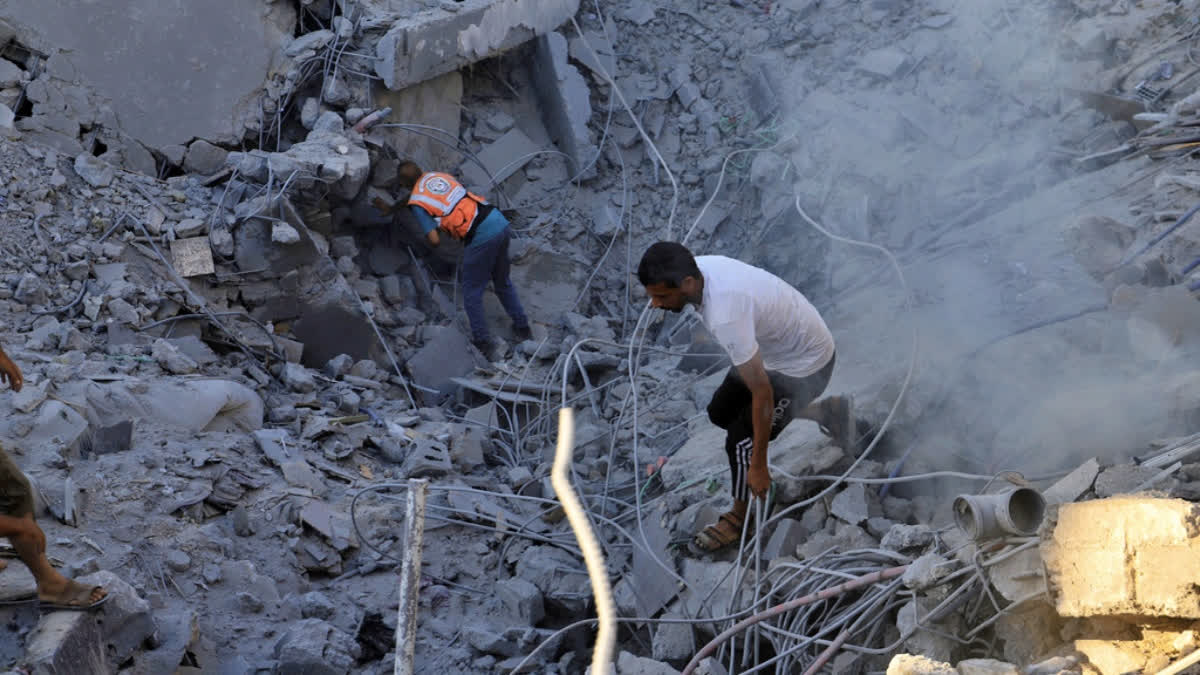Deir Al-Balah/Jerusalem: The Palestinian death toll from nearly nine months of Israel's war in the besieged territory has surged past 38,000. The health ministry in Gaza said that in the last 24 hours, the bodies of 58 people had been brought to hospitals, bringing the overall death toll to 38,011.
It said more than 87,000 people have been wounded in the fighting. Meanwhile, an Israeli official said Prime Minister Benjamin Netanyahu will dispatch negotiators to resume Gaza cease-fire talks. The decision on Thursday comes a day after Hamas submitted a new response a US-backed proposal for a phased cease-fire.
The Israeli official, speaking on condition of anonymity to discuss internal deliberations, says Netanyahu has decided to authorize a team to continue talks. There was no word on when or where the talks would talk place. Previous talks have stalled over Hamas' insistence that Israel agree to an end of the war and full withdrawal of its troops from Gaza.
The official says Netanyahu reiterated his position that Israel will not end the war until it reaches its goals of destroying Hamas' military and governing capabilities and returning all hostages held in Gaza. An Israeli anti-settlement monitoring group says the government has approved plans to build nearly 5,300 new homes in settlements in the occupied West Bank.
It is the latest move by Israel's hard-line government to beef up the settlements as part of a strategy to cement Israel's control over the West Bank and prevent the establishment of a future Palestinian state. Peace Now says the government's Higher Planning Council approved or advanced plans for 5,295 homes in dozens of settlements.
Netanyahu's government is dominated by settlers and their supporters. He has placed a former settler leader, Bezalel Smotrich, in charge of settlement policy. COGAT, the Israeli defence body that oversees the planning council, referred questions to Netanyahu's office, which did not immediately respond to a request for comment.
Israel's Cabinet was to convene Thursday to discuss Hamas' latest response to a US-backed proposal for a phased cease-fire in Gaza, as diplomatic efforts aimed at ending the nine-month war stirred back to life after a weekslong hiatus.
Fighting, meanwhile, intensified between Israel and Lebanon's Hezbollah, with the militant group saying it fired more than 200 rockets and exploding drones into northern Israel to avenge the killing of a senior commander in an Israeli airstrike the day before.
The relatively low-level conflict has literally set the border ablaze and raised fears of a potentially even more devastating war in the Middle East. Hezbollah has said it will halt its attacks if there is a cease-fire between Hamas a fellow Iran-backed ally and Israel.
The United States has rallied world support behind a plan that calls for the release of all of the scores of hostages still held by the militant Hamas group in return for a lasting truce and the withdrawal of Israeli forces from Gaza.
But until now, neither side appears to have fully embraced it. Hamas suggested amendments to the proposal last month, some of which the US said were unworkable, without providing specifics.
Netanyahu has given conflicting stances. He confirmed that the original proposal was an Israeli one. But he has also said he would accept only a partial deal, after which Israel would return to its military campaign to destroy Hamas.
Hamas confirmed on Wednesday that it had sent another response to Egypt and Qatar, which are mediating the talks, without providing details. A US official said the Biden administration was examining the response, calling it constructive but saying more work needed to be done. The official, who wasn't authorized to comment publicly, spoke on condition of anonymity.
An Israeli official said Netanyahu would convene a Cabinet meeting on Thursday to discuss the latest developments surrounding the negotiations. The official, who wasn't authorized to discuss the meeting with the media, spoke on condition of anonymity. Israel would likely hold additional consultations before making a final decision on any amended proposal.
Hamas political official Bassem Naim said the group has neither accepted nor rejected the American proposal and has responded with some ideas to bridge the gap between the two sides, without elaborating. Ismail Haniyeh, Hamas' top political leader, shared suggestions with Egyptian, Qatari and Turkish officials, the group said in a statement late Wednesday.
US officials have said the latest proposal has new language that was proposed to Egypt and Qatar on Saturday and addresses indirect negotiations that are set to commence during the first phase of the three-phase deal that President Joe Biden laid out in a May 31 speech. The first phase calls for a cease-fire, a withdrawal of Israeli forces from all densely populated areas of Gaza and the release of a number of hostages, including women, older people and the wounded, in exchange for the release of hundreds of Palestinian prisoners.
The proposal called for the parties to negotiate the terms of the second phase during the 42 days of phase one. Under the current proposal, the negotiations are meant to lead to a sustainable calm and the withdrawal of all Israeli troops from Gaza with the release of all remaining men, both civilians and soldiers, held captive by Hamas in return for an Israeli release of Palestinian prisoners. The third phase would see the return of the remains of hostages.
The transition from the first to the second phase has appeared to be the main sticking point. Hamas is concerned that Israel will restart the war after the first phase, perhaps after making unrealistic demands in the talks. Israeli officials have said they want the negotiations to lead to Hamas' removal from power in Gaza a provision not spelled out in the proposal. They have also pushed for a time limit on negotiations to keep pressure on Hamas and prevent it from drawing out talks and the initial cease-fire.
In a lengthy television interview last month, Netanyahu said that he was prepared to make a partial deal, but was committed to continuing the war after a pause in order to annihilate Hamas. Later, speaking before Israel's parliament, he said Israel remains committed to the deal outlined by Biden.



